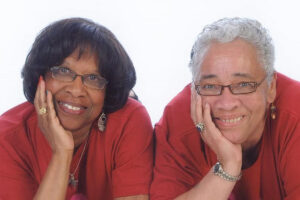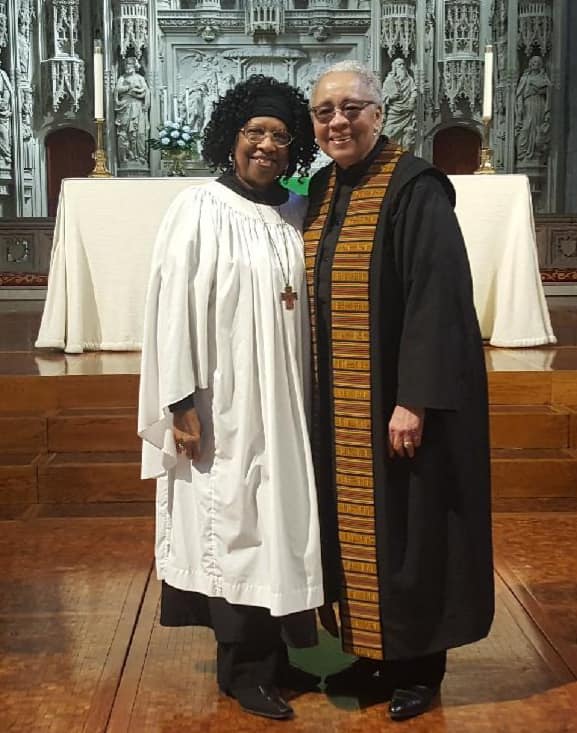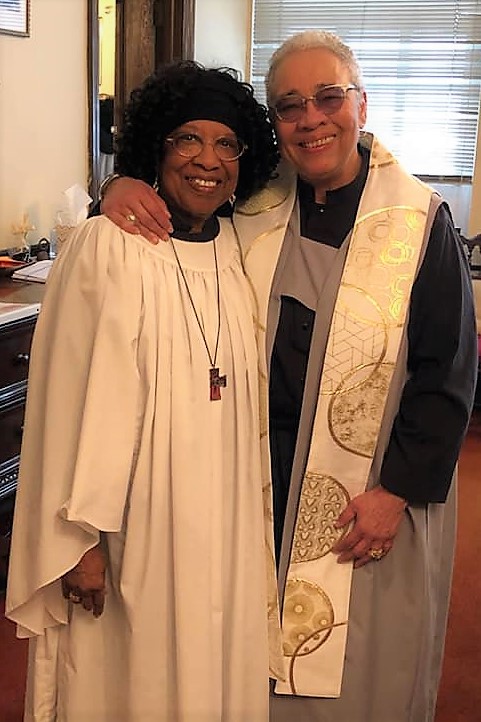
The Reverend Shug G. will be the first to tell you subtlety is not one of her gifts. She and her wife Doris never dreamed they would end up in the Midwest, be legally married, and be so accepted in church.
Shug currently serves as Deacon at St. Peter’s Episcopal Church in Ladue. On July 24, she will be ordained to the priesthood and become an assistant rector at St. Martin’s Episcopal Church in Ellisville.
Longtime commitments

Last February, Shug and Doris celebrated 35 years together. Born and raised in New York City, Shug’s work as an educator took her to California, where she soon became an administrator at the University of California, Los Angeles. She met Doris, a Philadelphia native, at a social event in San Francisco in 1986. Shug says she is compelled to say honestly (while wearing her clerical collar), “Doris couldn’t stand me when we first met. She had no use for me at all. For the next four years, I was relentless in my pursuit, and she finally just gave in.”
Once Doris retired in the mid-90s, they moved to St. Louis to be closer to Shug’s aging father in Kansas City. After he passed, they stayed put. Shug began to take on leadership roles and served as Head Verger at Christ Church Cathedral in downtown St. Louis. In 2016, Shug and Doris were joined in holy matrimony at their church. She says, “The law caught up with us.”
This past January, Shug was ordained to the Sacred Order of Deacons. She is particularly proud to have been ordained by the newly elected Bishop of Missouri, the Rt. Rev. Deon K. Johnson, an openly gay, Black bishop who is married with two children. Rev. Johnson received over 70 percent of the vote from both lay and clergy delegates at the diocesan convention—on the first ballot, which she says is highly unusual.
Probably the most surprising fact about the deacon-soon-to-be-priest is how much she loves The Godfather movies. She’s seen the original over 200 times.
Adjusting to virtual church

When COVID-19 first appeared and everything began to shut down, Shug says it was a challenge to get 42 parishes to go to virtual sessions, particularly the very small and rural parishes without reliable internet. The church helped parishes apply for funding to get equipment.
Social distancing needs meant some churches couldn’t reach even limited capacity requirements. The length of a church’s pews or how many attendees were within the same household had to be considered. Shug says, “That could be 7 to 10 people for some churches.”
St. Peter’s populated its Facebook and YouTube channels with live-streamed morning prayers and videos of sermons and hymns. Shug presented her sermons from her office with Doris by her side. Doris says, “[Shug] would laugh at me on Sunday mornings when COVID first started, because I would get dressed like I’m going to church, sit in the ‘Shug Shack,’ and listen.”
Shug chuckles and says, “Meanwhile, Shug is there with her collar on and pajama bottoms.”
During Holy Week, from Palm Sunday to Easter Sunday, live services were allowed with limited capacity. St. Peter’s repeated services during the week, plus five services on Easter to accommodate those who wanted to attend. Shug was very busy, but she still found ways to have a good time. During a family service on Easter geared toward children, she wore bunny ears and slippers with her vestments. Doris adds, “And they loved it.”
Shug thinks a hybrid of virtual and live services are here to stay. Members who have health issues or are homebound have told Shug they’ve felt much more engaged with virtual services. She says, “We’re doing some strategic visioning right now to get a good sense of what all of that looks like and what the needs are out there.”
Sacred Conversations
St. Peter’s continues to post videos of their Sacred Conversations, meetings via Zoom in which guest speakers spark conversations about race within the predominately white congregation. Shug leads their anti-racism work and offers the opening prayer. She feels these meetings move the conversation forward and are an important part of changing the narrative. “I’ve seen the ‘scales fall from a lot of people’s eyes,’” she says, recalling a Bible passage.
Since the 1980s, The Episcopal Diocese of Missouri has focused on racism on a diocesan and church level through their Dismantling Racism Commission. Anti-racism training is required for all ordained or lay leadership roles in the diocese.
Nationally, The Episcopal Church created a resolution in 2015 to respond to systemic racial justice after a white supremacist killed nine Emanuel African Methodist Episcopal Church members. Racial justice and reconciliation became a priority at that time. Last April, The Episcopal Church released a 72-page report looking within the church to assess the racial makeup of its leadership and perception of race within its members.
The Sacred Conversations began with 25 people and came about in the aftermath of the murder of George Floyd and the Black Lives Matter protests. Shug spends a fair amount of time correcting a person’s choice of words, including, “No, you didn’t bring slaves here. You brought people here that you enslaved.” Shug says “White America” needs to understand they have been indoctrinated by white people in power to ignore systemic racism. For so long, she points out, the only Black history being taught in schools had been about slavery.
Shug says one of the first points she brings up to white people is “We’re not asking you to be our saviors, but if you want to take that role on and you see people are suffering and in Hell, sometimes you gotta go to Hell to save people. You can’t save me from over in Ladue or in Creve Coeur.”
Last year, St. Peter’s formed a partnership with Tabernacle church at 3801 Ashland Avenue in the Jeff-Vander-Lou neighborhood of North St. Louis city. About a dozen members of The Tab group attend the Sacred Conversations.
Shug is heartened when she sees someone’s understanding about an issue change, even when they don’t agree. “The ability to be able to respect one another—and I’m not going to say ‘meet in the middle of the road’ because sometimes it ain’t the middle of the road—but even if we have to yell across the fence, we’re going to talk.”